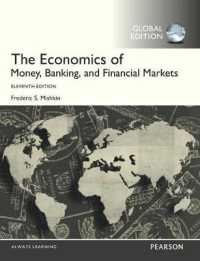Full Description
An annual publication of the Professional and Organizational Development Network in Higher Education (POD), To Improve the Academy offers a resource for improvement in higher education to faculty and instructional development staff, department chairs, faculty, deans, student services staff, chief academic officers, and educational consultants. Contents include: evidence-based changes in faculty and organizational development; creative collaboration between faculty and technologists; integrating research on teaching and learning and the practice of teaching; formal and informal support for pretenure faculty; strategies to support senior faculty; faculty development and productivity; using e-portfolios in hybrid professional development; developing a faculty learning community grounded in the science of how people learn.Assessing the long-term impact of a professional development program; an analysis of faculty development scholarship; program planning, prioritizing, and improvement; a consultations tracking database system for improving faculty development consultation services; graduate assistant development; using undergraduates to prepare international teaching assistants for the American classroom; tracking perceptions of preparation for future faculty competencies; student consultants of color and faculty members working together toward culturally sustaining pedagogy; measuring student learning to document faculty teaching effectiveness; learning with mobile apps; slow pedagogy, curriculum, assessment, and professional development; principles of video games that can enhance teaching; and the Reacting to the Past pedagogy and engaging the first-year student.
Contents
About the Authors xiii Preface xxix Acknowledgments xxxv Ethical Guidelines for Educational Developers xxxvii PART ONE New Paradigms for Faculty and Organizational Development 1. Navigating the New Normal: Evidence-Based Changes in Faculty and Organizational Development 3 Terre H. Allen, Holly Harbinger, Donald J. Para 2. Envisioning Creative Collaboration between Faculty and Technologists 21 Gail A. Rathbun, Sally Kuhlenschmidt, David Sacks 3. Fostering a Growth Mind-Set: Integrating Research on Teaching and Learning and the Practice of Teaching 39 Beth A. Fisher, Carolyn L. Dufault, Michelle D. Repice, Regina F. Frey PART TWO Faculty Development Audience and Partners 4. Formal and Informal Support for Pretenure Faculty: Recommendations for Administrators and Institutions 59 Gwendolyn Mettetal, Gail M. McGuire 5. Keeping the Fire Burning: Strategies to Support Senior Faculty 73 Michael J. Zeig, Roger G. Baldwin 6. Enhancing Vitality in Academic Medicine: Faculty Development and Productivity 89 Megan M. Palmer, Krista Hoffmann-Longtin, Tony Ribera, Mary E. Dankoski, Amy K. Ribera, Tom F. Nelson Laird 7. Connect to Learning: Using e-Portfolios in Hybrid Professional Development 109 Bret Eynon, Judit Torok, Laura M. Gambino 8. Developing a Faculty Learning Community Grounded in the Science of How People Learn: A Year-Long, Faculty-Led Teaching and Learning Seminar 127 Al Rudnitsky, Glenn W. Ellis, Patricia Marten DiBartolo, Kevin M. Shea 9. Assessing the Long-Term Impact of a Professional Development Program 145 Marcia M. Tennill, Margaret W. Cohen PART FOUR Reflections on What We Do 10. Faculty Development Scholarship: An Analysis of To Improve the Academy, 1982--2011 163 Kathryn E. Linder, Suzanna Klaf 11. Program Planning, Prioritizing, and Improvement: A Simple Heuristic 183 Peter Felten, Deandra Little, Leslie Ortquist-Ahrens, Michael Reder 12. A Consultations Tracking Database System for Improving Faculty Development Consultation Services 199 Jason Rhode, Murali Krishnamurthi PART FIVE Graduate Teaching Assistants: Innovative Approaches 13. From Outsiders to Insiders: Graduate Assistant Development at State Comprehensive Universities 217 Kathleen M. Brennan, Laura Cruz, Freya B. Kinner 14. Using Undergraduates to Prepare International Teaching Assistants for the American Classroom 235 Warren E. Christian, Brian J. Rybarczyk 15. Tomorrow's Professor Today: Tracking Perceptions of Preparation for Future Faculty Competencies 251 Michael S. Palmer, Deandra Little PART SIX Enhancing Student Learning 16. Student Consultants of Color and Faculty Members Working Together Toward Culturally Sustaining Pedagogy 271 Alison Cook-Sather, Praise Agu 17. Measuring Student Learning to Document Faculty Teaching Effectiveness 287 Linda B. Nilson 18. Mobile App Learning Lounge: A Scalable and Sustainable Model for Twenty-First-Century Learning 301 Michael H. Truong PART SEVEN New Pedagogical Concepts 19. Determining Our Own Tempos: Exploring Slow Pedagogy, Curriculum, Assessment, and Professional Development 319 Peter A. Shaw, Bob Cole, Jennifer L. Russell 20. Pedagogical Gamification: Principles of Video Games That Can Enhance Teaching 335 Kevin Yee 21. The Reacting to the Past Pedagogy and Engaging the First-Year Student 351 Paula Kay Lazrus, Gretchen Kreahling McKay







